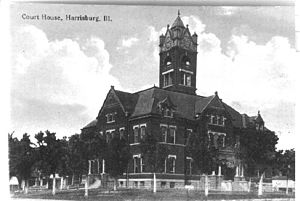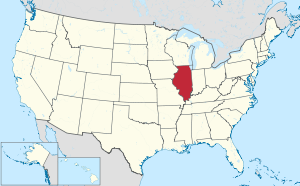Saline County is a county in Southern Illinois. At the 2020 census, it had a population of 23,768.[1] The largest city and county seat is Harrisburg.[2] This area of Southern Illinois is known locally as "Little Egypt".
Saline County | |
|---|---|
 Former Saline County Courthouse in Harrisburg | |
 Location within the U.S. state of Illinois | |
 Illinois's location within the U.S. | |
| Coordinates: 37°45′N 88°32′W / 37.75°N 88.54°W | |
| Country | |
| State | |
| Founded | 1847 |
| Named for | Saline River |
| Seat | Harrisburg |
| Largest city | Harrisburg |
| Area | |
• Total | 387 sq mi (1,000 km2) |
| • Land | 380 sq mi (1,000 km2) |
| • Water | 7.0 sq mi (18 km2) 1.8% |
| Population (2020) | |
• Total | 23,768 |
| • Density | 61/sq mi (24/km2) |
| Time zone | UTC−6 (Central) |
| • Summer (DST) | UTC−5 (CDT) |
| Congressional district | 12th |
| Website | www |
Three major towns in Saline County are connected by U.S. Route 45, and formerly by the now-abandoned Cairo and Vincennes/Big Four/New York Central Line, from north to south: Eldorado, Harrisburg, and Carrier Mills.
Geography
editAccording to the U.S. Census Bureau, the county has a total area of 387 square miles (1,000 km2), of which 380 square miles (980 km2) is land and 7.0 square miles (18 km2) (1.8%) is water.[3]
The Saline County area is mostly rolling hills throughout gradually rising to the Hills of the Shawnee National Forest. The Saline River flows through the central point of the county in three forks: North, Middle, and South. To the north of Eldorado there are flat lowlands.[4]
Climate and weather
edit| Harrisburg, Illinois | ||||||||||||||||||||||||||||||||||||||||||||||||||||||||||||
|---|---|---|---|---|---|---|---|---|---|---|---|---|---|---|---|---|---|---|---|---|---|---|---|---|---|---|---|---|---|---|---|---|---|---|---|---|---|---|---|---|---|---|---|---|---|---|---|---|---|---|---|---|---|---|---|---|---|---|---|---|
| Climate chart (explanation) | ||||||||||||||||||||||||||||||||||||||||||||||||||||||||||||
| ||||||||||||||||||||||||||||||||||||||||||||||||||||||||||||
| ||||||||||||||||||||||||||||||||||||||||||||||||||||||||||||
In recent years, average temperatures in the county seat of Harrisburg have ranged from a low of 22 °F (−6 °C) in January to a high of 89 °F (32 °C) in July, although a record low of −23 °F (−31 °C) was recorded in February 1951 and a record high of 113 °F (45 °C) was recorded in July 1936. Average monthly precipitation ranged from 3.04 inches (77 mm) in September to 4.98 inches (126 mm) in May.[5]
Adjacent counties
edit- Hamilton County (north)
- White County (northeast)
- Gallatin County (east)
- Hardin County (southeast)
- Pope County (south)
- Johnson County (southwest)
- Williamson County (west)
- Franklin County (northwest)
National protected area
edit- Shawnee National Forest (part)
State protected areas
editTransportation
editTransit
editMajor highways
editDemographics
edit| Census | Pop. | Note | %± |
|---|---|---|---|
| 1850 | 5,588 | — | |
| 1860 | 9,331 | 67.0% | |
| 1870 | 12,714 | 36.3% | |
| 1880 | 15,940 | 25.4% | |
| 1890 | 19,342 | 21.3% | |
| 1900 | 21,685 | 12.1% | |
| 1910 | 30,204 | 39.3% | |
| 1920 | 38,353 | 27.0% | |
| 1930 | 37,100 | −3.3% | |
| 1940 | 38,066 | 2.6% | |
| 1950 | 33,420 | −12.2% | |
| 1960 | 26,227 | −21.5% | |
| 1970 | 25,721 | −1.9% | |
| 1980 | 28,448 | 10.6% | |
| 1990 | 26,551 | −6.7% | |
| 2000 | 26,733 | 0.7% | |
| 2010 | 24,913 | −6.8% | |
| 2020 | 23,768 | −4.6% | |
| 2023 (est.) | 22,873 | [6] | −3.8% |
| U.S. Decennial Census[7] 1790-1960[8] 1900-1990[9] 1990-2000[10] 2010-2013[1] | |||
As of the 2010 United States Census, there were 24,913 people, 10,379 households, and 6,631 families residing in the county.[11] The population density was 65.6 inhabitants per square mile (25.3/km2). There were 11,697 housing units at an average density of 30.8 per square mile (11.9/km2).[3] The racial makeup of the county was 93.0% white, 4.0% black or African American, 0.4% Asian, 0.4% American Indian, 0.1% Pacific islander, 0.4% from other races, and 1.8% from two or more races. Those of Hispanic or Latino origin made up 1.4% of the population.[11] In terms of ancestry, 17.8% were Irish, 16.6% were German, 12.9% were American, and 11.1% were English.[12]
Of the 10,379 households, 29.0% had children under the age of 18 living with them, 47.4% were married couples living together, 11.7% had a female householder with no husband present, 36.1% were non-families, and 31.9% of all households were made up of individuals. The average household size was 2.32 and the average family size was 2.89. The median age was 41.7 years.[11]
The median income for a household in the county was $35,644 and the median income for a family was $46,314. Males had a median income of $41,108 versus $28,464 for females. The per capita income for the county was $20,903. About 13.4% of families and 18.4% of the population were below the poverty line, including 26.5% of those under age 18 and 10.4% of those age 65 or over.[13]
Communities
editCities
editVillages
edit- Carrier Mills (Morrilsville)
- Galatia
- Muddy
- Raleigh
- Stonefort (partly in Williamson County)
Unincorporated communities
editTownships
editSaline County is divided into thirteen townships:
Politics
edit| Year | Republican | Democratic | Third party(ies) | |||
|---|---|---|---|---|---|---|
| No. | % | No. | % | No. | % | |
| 2020 | 8,103 | 73.07% | 2,789 | 25.15% | 197 | 1.78% |
| 2016 | 8,276 | 72.70% | 2,572 | 22.59% | 536 | 4.71% |
| 2012 | 6,806 | 63.49% | 3,701 | 34.52% | 213 | 1.99% |
| 2008 | 6,099 | 53.15% | 5,083 | 44.29% | 294 | 2.56% |
| 2004 | 7,057 | 59.73% | 4,697 | 39.76% | 60 | 0.51% |
| 2000 | 5,933 | 50.93% | 5,427 | 46.58% | 290 | 2.49% |
| 1996 | 3,693 | 31.66% | 6,156 | 52.77% | 1,816 | 15.57% |
| 1992 | 3,667 | 27.67% | 7,258 | 54.76% | 2,329 | 17.57% |
| 1988 | 5,798 | 46.31% | 6,676 | 53.32% | 47 | 0.38% |
| 1984 | 7,176 | 54.15% | 6,038 | 45.57% | 37 | 0.28% |
| 1980 | 7,157 | 53.95% | 5,683 | 42.84% | 425 | 3.20% |
| 1976 | 5,970 | 44.25% | 7,472 | 55.38% | 51 | 0.38% |
| 1972 | 7,660 | 59.30% | 5,226 | 40.46% | 32 | 0.25% |
| 1968 | 6,913 | 49.92% | 5,985 | 43.22% | 951 | 6.87% |
| 1964 | 5,691 | 40.57% | 8,337 | 59.43% | 0 | 0.00% |
| 1960 | 8,853 | 56.36% | 6,835 | 43.52% | 19 | 0.12% |
| 1956 | 8,481 | 53.96% | 7,215 | 45.91% | 20 | 0.13% |
| 1952 | 9,206 | 54.13% | 7,771 | 45.70% | 29 | 0.17% |
| 1948 | 7,676 | 49.57% | 7,718 | 49.84% | 91 | 0.59% |
| 1944 | 9,083 | 54.92% | 7,351 | 44.45% | 105 | 0.63% |
| 1940 | 10,567 | 49.43% | 10,692 | 50.02% | 118 | 0.55% |
| 1936 | 9,055 | 46.16% | 10,253 | 52.27% | 308 | 1.57% |
| 1932 | 6,294 | 38.21% | 9,725 | 59.04% | 454 | 2.76% |
| 1928 | 7,525 | 53.82% | 6,337 | 45.32% | 121 | 0.87% |
| 1924 | 6,084 | 47.03% | 4,037 | 31.21% | 2,816 | 21.77% |
| 1920 | 6,722 | 52.96% | 3,500 | 27.58% | 2,470 | 19.46% |
| 1916 | 7,061 | 50.49% | 5,930 | 42.41% | 993 | 7.10% |
| 1912 | 1,468 | 18.10% | 3,599 | 44.37% | 3,044 | 37.53% |
| 1908 | 3,125 | 52.12% | 2,471 | 41.21% | 400 | 6.67% |
| 1904 | 2,735 | 56.93% | 1,758 | 36.59% | 311 | 6.47% |
| 1900 | 2,495 | 52.46% | 2,186 | 45.96% | 75 | 1.58% |
| 1896 | 2,605 | 52.81% | 2,296 | 46.54% | 32 | 0.65% |
| 1892 | 2,171 | 49.90% | 1,828 | 42.01% | 352 | 8.09% |
See also
editReferences
edit- ^ a b "State & County QuickFacts". United States Census Bureau. Archived from the original on June 7, 2011. Retrieved July 8, 2014.
- ^ "Find a County". National Association of Counties. Retrieved June 7, 2011.
- ^ a b "Population, Housing Units, Area, and Density: 2010 - County". United States Census Bureau. Archived from the original on February 12, 2020. Retrieved July 12, 2015.
- ^ State Geologist, Illinois (1875). "Geological Survey of Illinois". google.com. Retrieved June 14, 2015.
- ^ a b "Monthly Averages for Harrisburg, Illinois". The Weather Channel. Retrieved January 27, 2011.
- ^ "Annual Estimates of the Resident Population for Counties: April 1, 2020 to July 1, 2023". United States Census Bureau. Retrieved April 2, 2024.
- ^ "U.S. Decennial Census". United States Census Bureau. Retrieved July 8, 2014.
- ^ "Historical Census Browser". University of Virginia Library. Retrieved July 8, 2014.
- ^ "Population of Counties by Decennial Census: 1900 to 1990". United States Census Bureau. Retrieved July 8, 2014.
- ^ "Census 2000 PHC-T-4. Ranking Tables for Counties: 1990 and 2000" (PDF). United States Census Bureau. Retrieved July 8, 2014.
- ^ a b c "DP-1 Profile of General Population and Housing Characteristics: 2010 Demographic Profile Data". United States Census Bureau. Archived from the original on February 13, 2020. Retrieved July 12, 2015.
- ^ "DP02 SELECTED SOCIAL CHARACTERISTICS IN THE UNITED STATES – 2006-2010 American Community Survey 5-Year Estimates". United States Census Bureau. Archived from the original on February 13, 2020. Retrieved July 12, 2015.
- ^ "DP03 SELECTED ECONOMIC CHARACTERISTICS – 2006-2010 American Community Survey 5-Year Estimates". United States Census Bureau. Archived from the original on February 13, 2020. Retrieved July 12, 2015.
- ^ Leip, David. "Dave Leip's Atlas of U.S. Presidential Elections". uselectionatlas.org.
External links
edit- Saline County Chamber of Commerce
- Saline County Official Website (Under Development)
- "Tails and Trails of Illinois", Stu Fliege, University of Illinois Press,2002.
- "https://web.archive.org/web/20120206132243/http://www.iltrails.org/saline/towns_cities.html, © 2000-2001 by Debbie Woolard, Illinois Trails History and Genealogy.
- Gillum Ferguson. 2007. The Perilous Infancy of Saline County, Journal of Illinois History, Vol. 10, p. 49.
